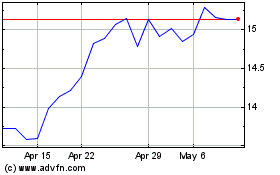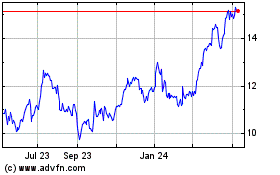Deutsche Bank Discusses Big Asset Cleanup -- WSJ
April 24 2019 - 3:02AM
Dow Jones News
By Jenny Strasburg
This article is being republished as part of our daily
reproduction of WSJ.com articles that also appeared in the U.S.
print edition of The Wall Street Journal (April 24, 2019).
Deutsche Bank AG executives have discussed creating a new unit
to house unwanted assets and businesses that could be earmarked for
closure, part of contingency planning under way should a possible
merger with German rival Commerzbank AG fall through, according to
people familiar with the matter.
Deutsche Bank for years has been retooling its strategy and
management, promising to reinvigorate profits, repair compliance
weaknesses and cut rising costs. Executives insisted publicly up
until late 2018 that the bank should only consider deals after it
heals itself. Now, deep into merger talks, it is looking at a
potentially bigger cleanup effort than it previously signaled.
Planning for a possible no-deal outcome has taken on greater
urgency at Deutsche Bank as merger talks have proven more
complicated than proponents originally expected, the people
said.
Staunch union resistance to massive job cuts needed for a deal
to work financially have proved an especially difficult impediment
since the two banks revealed in mid-March that they are exploring a
potential tie-up. Deutsche Bank at that time described the merger
talks as part of a strategic review aimed at boosting its
profitability.
A new unit for disposing of assets and discontinued operations
-- a so-called bad bank -- could be used flexibly, whether Deutsche
Bank strikes a deal or not, some of the people said. A merger would
likely require Deutsche Bank to make sizable cuts to parts of its
investment bank, narrowing the scope of businesses to focus
resources on more-profitable areas as part of a strategy overhaul,
some of the people said.
Businesses the bank has eyed for possible downsizing include
equities, equity derivatives and portions of rates trading.
Deutsche Bank executives have signaled a strong commitment to areas
like credit trading, debt underwriting and foreign exchange and
cash management to serve corporate clients.
The discussions have been aimed at allowing the bank to map out
potential capital needs, profit and cost forecasts while keeping
its options open, some people close to the bank say.
Deutsche Bank has heard demands from investors to assess
alternatives to a merger, by analyzing other options and how they
would affect the bank's capital demands and balance of
businesses.
The planning inside the bank includes discussions about
shrinking portions of the global trading operations, which include
chronically underperforming businesses with burdensome costs, some
of the people said.
Deutsche Bank has explored options to reshape various pieces of
the bank. Officials with its asset-management arm, DWS, have
discussed a potential deal to combine with Swiss rival UBS AG's
asset management business, among other options, according to people
familiar with the matter. Such a deal would likely see Deutsche
Bank remain DWS's biggest shareholder with a goal of growing the
merged entity, with UBS owning a stake. DWS already is publicly
traded, providing shares for currency in such a deal.
The talks aren't exclusive or guaranteed to result in a deal,
and timing of any potential agreement is uncertain, according to a
person close to the matter. Bloomberg earlier reported on the
talks.
The bank is scheduled to report first-quarter earnings on
Friday, raising pressure on executives to decide whether to pursue
a deal with Commerzbank.
Paul Achleitner, chairman of the supervisory board, has said
publicly that the bank would update investors on the merger talks
by Friday. Executives on Tuesday still hoped to meet that deadline
this week, people familiar with the matter said.
Deutsche Bank's struggling investment bank was a central focus
of Commerzbank merger talks from the start. Investors have
increasingly pressured executives to shed businesses that
chronically lose money or barely break even. At least one prominent
investor has urged Deutsche Bank executives to close its
money-losing U.S. equities business and cut the equities operations
elsewhere.
A new bad-bank unit would allow Deutsche Bank to wall off
business lines it intends to close or de-emphasize as well as
positions that take time to sell or run down. Deutsche Bank
previously had a similar unit called noncore operations that it
used to dispose of unwanted assets, many of them dating to the
financial crisis. That loss-making unit reported revenues and other
financial details distinct from the bank's core businesses.
Deutsche Bank closed the noncore unit in late 2016. In March
2017, the bank launched a share sale to raise EUR8 billion in
capital. In the process, it designated a new pile of around EUR20
billion in risk-weighted assets as "nonstrategic." They were
earmarked to be run down within the investment bank rather than as
a new separate unit.
The return of discussions about a noncore unit highlight
Deutsche Bank's continued difficulties in streamlining and cutting
costs to focus on businesses where it has a competitive edge.
Write to Jenny Strasburg at jenny.strasburg@wsj.com
(END) Dow Jones Newswires
April 24, 2019 02:47 ET (06:47 GMT)
Copyright (c) 2019 Dow Jones & Company, Inc.
Commerzbank (PK) (USOTC:CRZBY)
Historical Stock Chart
From Jun 2024 to Jul 2024

Commerzbank (PK) (USOTC:CRZBY)
Historical Stock Chart
From Jul 2023 to Jul 2024
